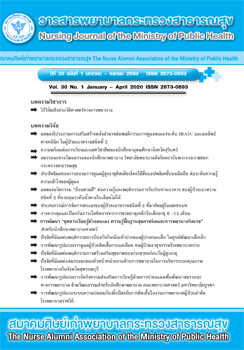The Effects of the Innovation “3-Color Spoon” on Knowledge and Dietary Consumption among Patients with Type 2 Diabetes Mellitus and Poor Glycemic Control
Main Article Content
Abstract
This quasi-experimental research used a one group pretest-posttest design that aimed to compare knowledge and dietary consumption behaviors among patients with type 2 diabetes mellitus and poor glycemic control, before and after utilizing the innovation “3-Color Spoon”. The sample consisted of fourteen participants selected by purposive sampling technique. The research instruments consisted of the innovation “3-Color Spoon”, knowledge test and a dietary consumption behavior questionnaire. Data were collected by interviews using the questionnaire. Data were analyzed by descriptive statistics and paired t-tests. The results revealed that after the program, the mean scores of knowledge and dietary consumption behaviors among patients with type 2 diabetes mellitus and poor glycemic control were higher than those before they received the innovative program. The differences were statistically significant (p<.05). This research recommends that nurses should focus on providing knowledge regarding the diabetic diet as an important factor that leads to constant blood sugar control.
Article Details
บทความและรายงานวิจัยในวารสารพยาบาลกระทรวงสาธารณสุข เป็นความคิดเห็นของ ผู้เขียน มิใช่ของคณะผู้จัดทำ และมิใช่ความรับผิดชอบของสมาคมศิษย์เก่าพยาบาลกระทรวงสาธารณสุข ซึ่งสามารถนำไปอ้างอิงได้
References
2. Bureau of Non Communicable Disease, Ministry of Public Health. Annual epidemiological surveillance report 2017. Bangkok: Uksorngraphic design. 2017. (in Thai).
3. Surin Province Statistical office. Provincial statistic report: 2012. Surin. Sor Panpen. 2012. (in Thai).
4. Bureau of Non Communicable Disease, Ministry of Public Health. Annual Report 2017. Bangkok: Uksorngraphic design.2017. (in Thai).
5. Somtou P, Pitchayapinyo P, Teingtum V, Sujirarat D. Predictive factors of dietary consumption among diabetes mellitus type2. Journal of Public Health Nursing. 2016;30(1):1-12. (in Thai).
6. Sudjai S, Terawiwat M, Eimami N, Tanskul S. Factors related to food consumption behavior among typ2 diabetes patients in nonthaburi province. Paper presented at: The 3th National Academic Conference and Research. Proceeding of The 3th National Academic Conference and Research; 2016 June 17; Nakornratchasima, Thailand. (in Thai).
7. Mahuwan P, Srisuwan P. Development of animation diabetes disease for family caregiver Prachomklo Phetchaburi hospital. Paper presented at National Academic Conference and Research. Proceeding of National Academic Conference and Research; 2016 August 29-30; Pisanulok, Thailand. (in Thai).
8. Murray RB, Zentner PJ. Nursing assessment and health promotion: Strategies through the life span. 5thed. New Jersey: America;1993.
9. Soipassa A, Teerawiwat M, Eimamee N. The effect of food consumption program applied information motivation and behavioral skills model on blood sugar level control of diabetes patients, samutprakan province. Journal of Health Education. 2016;39(132):51-63. (in Thai).
10. Methaneedol M. The effect of health education program about food restriction for control blood sugar in diabetes mellitus patients, muangna subdistric, donjan district, kalasin province. [Master thesis]. Chonburi: Buprapha University.2013. (in Thai).
11. Kitcharernchai R. The effectiveness of a nutritional self-management program on food consumption behaviors, HbA1C, and body mass index in persons with type2 diabetes[Master thesis]. Bangkok: Mahidol University.2013. (in Thai).
12. Ukong S, Sompojareon M, Kengkarnpanit T, Rawiworakul T. Effects of self-regulation program on diet control for patient with type2 diabetes. Paper presented at: The 17th National Health Education Conference. Proceeding of The 17th National Health Education Conference; 2015 May 14-16; Chonburi, Thailand. (in Thai).
13. Sakarinkhul P. The construction and efficacy of education method on thai vegetable exchange lists for diabetes patient. Journal of Family Medicine and Primary Care. 2009;1(2):6-12. (in Thai).
14. Boonplum R. Nutrition education pattern on dietary Control According to nutrition therapy for patients with type II diabetes [Master thesis]. Bangkok: Mahidol University. 2013. (in Thai).
15. Kallaka S, Chantra R, Sarakshetrin A, Thanaroj S, Saojawutipong W. The effects of using a video shadow puppet troupe and self-care manual on knowledge and self-care behavior of persons with type2 diabetes mellitus. Nursing Journal of the Ministry of Public Health. 2017;27(1):146-56. (in Thai).
16. Thanarun T. Multimedia designs for learning diabetes with old age patients. The Journal of the Veridian E-Journal,Silpakorn University (Humanities, Social Sciences, and Arts). 2013;6(5):1-15. (in Thai).
17. Dechakul M, Kasiphol T, Durongrittichai V. The policy suggestion related to caring system development for diabetes patients in uncontrollable blood sugar of maekhong community health center somdet phraphuttha loetla hospital, samut songkhram province. Journal of The Royal Thai Army Nurses. 2014;15(3):269-78. (in Thai).
18. Intharabut M, Muktabhan B. Perception and practices of dietary control in type 2 diabetic patients. Srinagarind Medical Journal. 2007;22(3):283-90. (in Thai).
19. Natason A, Piaseu N, Pinthong P. Nutrition knowledge, attitude toward food, food consumption behavior, and nutrition status in semi-rural community, ubonratchathani province. Ramathibodi Nursing Journal. 2017;23(3):344-357. (in Thai).
20. Chaiyasamoot S, Promla V. Guidelines for developing knowledge, attitude, and blood sugar controlling behaviors of diabetic patients with non-insulin dependence at pathumthani. Graduate School Mahamakut Buddhist University Humanities and Social Sciences. 2017;15(2):111-23. (in Thai).
21. Kuharattanachai C. Introduction to Statistic. Bangkok: Mahanakorn University of Technology. 1999. (in Thai).
22. Lynn M. Determination and quantification of content validity. Nursing Research. 1986;35:382-5.

